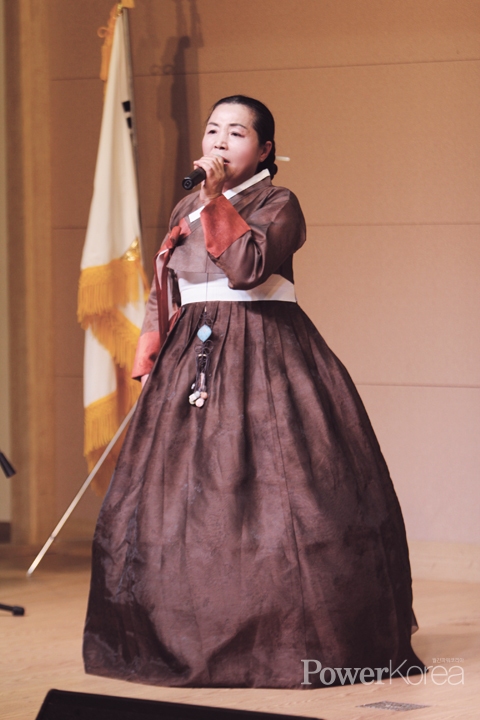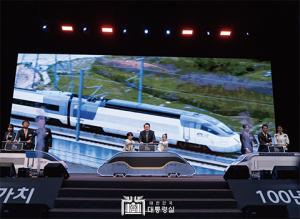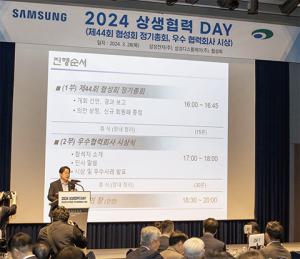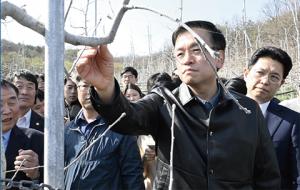 |
||
| ▲ President Kang So-bin | ||
Arirang is the representative traditional Korean song and probably the most famous Korean song known to the world. Experts say that there are about 3,600 Arirang songs in 60 kinds. In an effort to preserve these valuable cultural assets, the Cultural Heritage Administration carried out a factual survey in 2004.
Arirang listed its name in the UNESCO World Intangible Cultural Heritage in 2012 and received 83% support from American, French, German and Italian composers at a beautiful songs selection. Arirang has been sung to express sadness, anger and patriotism by the Korean people for many years and mostly passed down from mouth to mouth or from organization to organization.
The jeju Arirang Preservation Society in particular focused on preserving and passing down Arirang songs sung on Jeju Island. The president Kang So-bin was born and bred in Jeju and traveled Seoul, Daegu, Cheongju and Sangju in order to deepen her voice and knowledge. She learned Jeju folk songs from her diver mother since childhood and expanded her interest to traditional Korean music which eventually led it to meet her teacher Jung Eun-ha of the Yeongnam Arirang Preservation Society.
Wherever you go in Korea, there always is Arirang of its own version: Pyongan, Gwanwon, Hamgyong, Gyeongsang (Miryang), Jeolla (Jindo) Gyeonggi and Chungcheong as well as outside regions such as Sakhalin and the Heuglyong River where Korean minorities are residing.
At the 2nd Jeju Arirang Lecture and Performance held on 29 November, the Korea Arirang Society president doctor Ki Mi-hyang and the Arirang School principal Kim Young-gap gave special lectures and the Jeju Arirang Preservation Society members gave performance themed on Jeju flowers, Udo Island, Jochon Arirang, Hallasan Arirang and Haenyeo dancing. Kang, in particular, sang Jeongseon Arirang.
According to a report of the Cultural Heritage Administration, there are 4 songs of Jeju Arirang: Flower Arirang, Miscellaneous Arirang, Jochon Arirang and Hallasan Arirang. The Flower Arirang has been passed down in private and the latter three have both private and written records. The Sehan University Korean music professor Lee Sang-gyun composed for Flower Arirang based on Jejusilki and also to Dol hareubang and Udo. Kang, on the other hand, added 7 verses to the remained 1 verse of Jochon Arirang written by Go Un-san (deceased).
The general Koyeorim of the Goryeo Kingdom mobilized the residents of the island to build 235km long stone walls round the island to protect Jeju from the constant attacks of the Japanese raiders. And Kang walked around the island following these stone walls and put their pains and sadness into the lyrics.
She stopped at the grave of children and at the site where 400 residents were executed a day during the April 3 Jeju Uprising. She said that she was like hearing their grudge and felt something coming up from her deep down. She delivered this heavy feeling into Jochon Arirang.
“There are four Jeju Arirangs. The Flower Arirang sings 17 kinds of flowers on Jeju while Jochon Arirang delivers joys and sorrows of married life in husband’s family. The Hallasan Arirang sings the island’s landscape and the Miscellaneous Arirang delivers a love story. In fact, you can put whatever story you want into a song of Arirang” says Kang.
In order to spread Jeju Arirang, Kang has staged at the Daegu Arirang Festival every year alongside Seoul Arirang Festival. On 10 December this year, she also took the stage of the Diaspora Arirang and the 11th Mungyeong Arirang Festival to introduce Jeju female diver’s dance on Jeju Arirang.
Apart from actively engaging in various festivals nationwide to spread Jeju Arirang, she is working in cooperation with the Jeju Arirang Preservation Society in Seogwipo (head Yoo Hae-hee), in west Daejung (head Lee Jung-sun), in Jeju City (head Sohn Young-mi), and the Jeju Arirang School.
“It is important for the Jeju Arirang Preservation Society to take part in making a contribution to consolidation of Jeju residents and to promotion of Jeju culture. As part of this effort, we are working on a singing contest and a Jeju Arirang Festival at the Arirang Hill in Akagima, Japan. Also, we are busy preparing to join the Sakhalin Arirang Festival.”
She added “All members of the Jeju Arirang Preservation Society are one mind to spread good values of local Arirang songs and folk music. We will continue our passion in research and development so that more and more people in Korea will know about these beautiful cultural assets.”
신태섭 기자 tss79@naver.com







